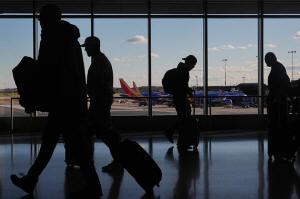While Trump threatens controllers, US flight cancellations will drag on
even after shutdown ends
[November 11, 2025]
By RIO YAMAT and JOSH FUNK
Air travelers should expect worsening cancellations and delays this week
even if the government shutdown ends, as the Federal Aviation
Administration rolls out deeper cuts to flights at 40 major U.S.
airports, officials said Monday.
The fourth day of the flight restrictions saw airlines scrap over 2,300
flights Monday and more than 1,000 flights set for takeoff Tuesday.
Unpaid for more than a month, some air traffic controllers have begun
calling out of work, citing stress and the need to take on second jobs.
President Donald Trump took to social media on Monday to pressure
controllers to “get back to work, NOW!!!” He called for a $10,000 bonus
for those who've stayed on the job and suggested docking pay for those
who haven't.
Rep. Rick Larsen, the top Democrat on the House Committee on
Transportation and Infrastructure, and Sen. Tammy Duckworth, ranking
member of the Senate’s Aviation Subcommittee, condemned the president’s
remarks, saying controllers deserve appreciation and support — not
attacks.
The head of the controllers union says its members are being used as a
“political pawn” in the shutdown fight.
Meanwhile, the Senate passed legislation Monday to reopen the
government, though the bill also needs to clear the House and final
passage could be days away. Transportation Secretary Sean Duffy made
clear last week that flight cuts will remain in place until the FAA sees
staffing levels stabilize at its air traffic control facilities.

And because the flight disruptions are widespread and ongoing, many
planes aren’t where they’re supposed to be, which could also slow the
airlines’ return to normal operations even after the FAA lifts the
order, said Mike Taylor, who leads research on airports and airlines at
J.D. Power.
“If you think about it, there’s all these aircraft that didn’t fly where
they were supposed to on a normal route,” Taylor said, noting airlines
will need to track down all their planes, figure out where each needs to
be, and find pilots and cabin crew for those flights.
Since Friday, airlines have canceled about 8,000 flights under orders to
drop 4% of flights at 40 of the nation’s busiest airports. That will
rise to 6% on Tuesday and 10% by week's end, the FAA says.
One in 10 flights nationwide were scratched Sunday — the fourth worst
day for cancellations in almost two years, according aviation analytics
firm Cirium.

[to top of second column]
|

Southwest Airlines planes sit at gates as travelers walk through
Baltimore/Washington International Thurgood Marshall Airport in
Baltimore, Monday, Nov. 10, 2025. (AP Photo/Stephanie Scarbrough)

Controller shortages also led to five-hour delays Monday evening at
Chicago O’Hare International Airport, where wintry weather added to
the disruptions earlier in the day, and the FAA warned that staffing
at over a dozen towers and control centers could cause delays in
cities including Philadelphia, Nashville and Atlanta.
That leaves travelers growing angry.
“All of this has real negative consequences for millions of
Americans, and it’s 100% unnecessary and avoidable,” said Todd
Walker, who missed his mom's 80th birthday when his flight was
canceled over the weekend.
The FAA also expanded flight restrictions Monday, barring business
jets and many private flights from using a dozen airports already
under commercial flight limits.
Airports nationwide have seen intermittent delays since the shutdown
began because the FAA slows air traffic when it's short on
controllers to ensure flights remain safe.
The shutdown has made controllers' demanding jobs even more
stressful, leading to fatigue and increased risks, said Nick
Daniels, president of the National Air Traffic Controllers
Association. He said the number who are retiring or quitting is
“growing” by the day.
During the six weekends since the shutdown began, an average of 30
air traffic control facilities had staffing issues. That’s almost
four times the number on weekends this year before the shutdown,
according to an Associated Press analysis of operations plans sent
through the Air Traffic Control System Command Center system.
Tuesday will be the second missed payday for controllers. It's
unclear how quickly they might be paid once the shutdown ends — it
took more than two months to receive full back pay after the 35-day
shutdown that ended in 2019, Daniels said.
The latest shutdown and money worries have become regular
“dinnertime conversations” for Amy Lark and her husband, both
Washington, D.C., area air traffic controllers.
“Yesterday, my kids asked me how long we could stay in our house,”
Lark said. Still, she said controllers remain “100% committed.”
All contents © copyright 2025 Associated Press. All rights reserved |